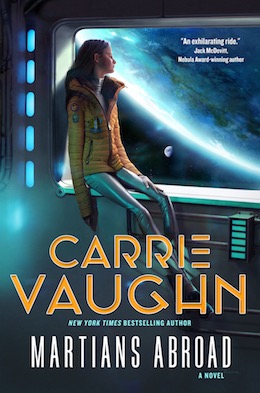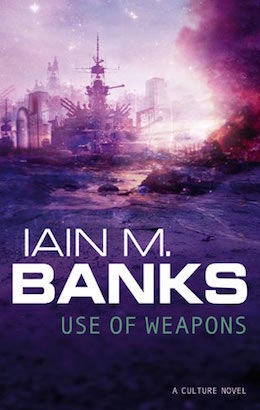Most science fiction and fantasy novels have a breaking point past which they would strain suspension of disbelief past bearing. Too many big ideas that don’t quite fit together, too much weirdness to process. Too many boundaries crossed for the fictional world to seem real. Good novels don’t get to that point. Great ones get close without crossing over.
Iain M. Banks’s novels of the Culture don’t actually seem to have that breaking point to begin with. Banks created a universe where the unbelievable and astonishing are part of the world, and suspension of disbelief isn’t needed because believing a constant stream of unbelievable worldbuilding is, in fact, part of the worldbuilding. From giant self-contained, sentient ships with too-whimsical names (the GSV Congenital Optimist) to characters existing in two places at once because cloned doppelgangers are a matter of course to far-out technology and extreme cultures and … actually, a list can’t contain the weirdness and joy of these books.
Use of Weapons isn’t the first of the Culture books I read. (That would be The Player of Games.) But it’s the one that, in Emily Dickinson’s phrasing, took the top of my head off. It’s the one I learned the most from.
Its structure is simultaneously linear and non-linear. You see, the novel has two different stories, moving in opposite directions on opposite timelines from a central starting point, that lead to the same discovery. Special agent Zakalwe has a dark past that he doesn’t remember. He moves toward rediscovering this past at the same time the second storyline, moving backward, takes us through how he became who he is, inevitably heading toward that same pivotal moment that his current self is on track for discovering. It sounds confusing. Reading it isn’t. It’s beautiful and inevitable, and the tension is unbearable. What’s more, the discovery, that piece of information that the entire novel trends toward in two different directions, is just as shocking and gut-punching as all that build-up would have you believe.
It’s a neat trick.
I borrowed this structure for my own novel, Discord’s Apple. I didn’t use it quite so well. I reversed it, with two timelines meeting at the end of the book instead of starting at the beginning. When the Publishers Weekly review called the book “brilliantly structured,” I knew it was because I pretty much stole that structure from a master. I feel like I cheated a little, simplifying the structure for my book. But I also think that’s okay. Because I’m not Iain M. Banks and I’m not writing about the Culture, where it feels like anything is possible.
Because really, the universe of the Culture is constructed to be one where anything is possible.
One scene I won’t ever forget: Zakalwe has just had a mission go spectacularly awry. How spectacularly? The tribal people he was infiltrating on this particular planet have beheaded him in a sacrifice to the gods. Fortunately, his handlers retrieved him in time to save him, or what’s left of him.
His main handler, Sma, visits him in the hospital, where he’s growing a new body. As you do.
“Hey,” he said. “Narrow one, this time, huh?” he smiled.
Sma nodded. “You could say that. Another few seconds and you’d have suffered brain damage; another few minutes and you’d have been dead. If only you’d had a homing implant; we could have picked you up days…”
“Oh now, Sma,” he said gently “You know I can’t be bothered with all that stuff.”
“Yeah, I know,” she said. “Well, whatever; you’re going to have to stay like this for a while.” Sma smoothed hair from his forehead. “It’ll take about two hundred days or so to grow a new body. They want me to ask you; do you want to sleep through the whole thing, or do you want to stay awake as normal … or anything in between? It’s up to you. Makes no difference to the process.”
“Hmm.” He thought about this. “I suppose I get to do lots of improving things, like listen to music and watch films or whatever, and read?”
“If you want,” Sma shrugged. “You can go the whole hog and spool fantasy head-tapes if you want.”
“Drink?”
“Drink?”
“Yeah; can I get drunk?”
There’s so much I love about this I hardly know where to start. First, the scene is from Zakalwe’s point of view. Zakalwe exists here as a head in some sort of medical situation. He can’t really see what’s going on, so we never get a description or picture of what this looks like: what it looks like to be a head in a medical bay undergoing regrowth of an entire body. Turns out, we don’t need it. Just being given the bare concept of the situation, the reader is capable of constructing the setting. Imagining vats, tubes, wires, beds, monitors, polite medical personnel. We all know what a hospital room looks like. This one’s just a bit … more so. The medical details, the technology of regrowing a body, don’t matter: just the situation. We’re pushing right up to the edge of suspension of disbelief, but the reader is such an active participant in constructing the scene from their own imagination, that it seems perfectly reasonable.
Moreover, there’s a question. When I got to this scene, I had to stop and ask myself that question: If I existed in the Culture and got beheaded, and I was saved and having my body regrown—would I want to stay awake? Or would I rather sleep? I don’t know! It’s crazy! It’s an impossible situation! But what if … I could get a lot of reading done in two hundred days of immobility. I could also catch up on a lot of sleep. It seems like it would be really strange, growing a new body. Except, in this world, the milieu of the Culture, maybe it wouldn’t seem strange at all. In our world, the standard would likely be to just a knock a person out for such a drastic medical procedure. But here, that the question—asleep or awake?—exists at all is part of the worldbuilding, part of its philosophy. Would you really want to waste two hundred days sleeping?
This scene engages the reader on a couple of levels: making them complicit in constructing the scene in the first place, and then inviting them to place themselves in that situation and think about the question.
A page later, Zakalwe makes his choice.
“I’ll stay awake,” he told her.
Sma smiled slowly. “I had a feeling you might.”
“You sticking around?”
“Could do,” the woman said. “Would you like me to?”
“I’d appreciate it.”
“And I’d like to.” She nodded thoughtfully. “Okay. I’ll watch you put on weight.”
A person can do just about anything with good company, it seems. Banks’s Culture books are very good company.
 Carrie Vaughn’s twentieth novel, Martians Abroad, about a teenage Martian who is sent to Earth for boarding school and isn’t happy about it at all, has just been released by Tor Books.
Carrie Vaughn’s twentieth novel, Martians Abroad, about a teenage Martian who is sent to Earth for boarding school and isn’t happy about it at all, has just been released by Tor Books.











I have to admit it never occurred to me that he didn’t remember. He really doesn’t want to think or talk about it, much less admit it, but he knows.
He tells his story to Dziet and Skaffen-Amtiskaw at the end. I think that the chapters covering that time are the story he tells them, and they are very carefully constructed to obscure the truth.
I remember that scene as well, but the main thing that I took away from it was that some thoughtful friend brought him a hat to wear, so he wouldn’t be naked.
This is my favourite Banks book. Awesome.
My favourite part of the headless scene comes at the very end:
Hum. Didn’t realize when I read it how close this was to the bedroom/hospital room on Vega 5 where Kip recuperated in “Have Spacesuit – Will Travel.”
There is no new thing under the sun… :D
My first Banks novel was Consider Phlebas, and it blew me out of the water – figuratively speaking. I suppose you could term the central theme of his Culture novels as Paradise has its limits.
Most of the Culture books aren’t actually about The Culture per se, they’re about where the Culture meets another (ahem) culture. Many times (including Use Of Weapons) the protagonist isn’t even a member of the Culture. The central theme is more “the limits of paradise are the interesting bits”.
Use of Weapons also has another of Bank’s trademarks (after ‘protagonist with a dark past’ which he uses in most of his books), which is a reveal or turn about 80-90% of the way through, followed by a bigger twist right at the end, that makes you re-think the whole book. Player of Games has a similar structure, as does The Wasp Factory.
Hmmm, might be time for another Banks read-through, while I wait for Charlie Stross’s latest one to make it’s way across the Atlantic.
Thanks for this article!! I have finally(because of this) decided to read Banks for the first time. Just ordered Consider Phlebas, Excession and Matter. Are those good choices, fellow Tor peoples??
@8: Consider Phlebas is a good starting point: I would however suggest reading The Player of Games before the more complex Excession.
Excession and Use of Weapons are frequently considered the best Culture novels. Matter is good as well, but I think he dwells on the Shellworld political stuff a little too much. Really it’s hard for me to pick a favorite because they are all basically fantastic standalone novels. There are occasional references to previous large events (like the Idiran war), but nothing that someone who hadn’t read previous novels couldn’t understand.
After having just read through the whole series again, I found myself enjoying Look to Windward and Surface Detail more than I remembered enjoying them the first time.